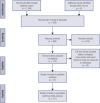Is the vitamin D status of patients with COVID-19 associated with reduced mortality? A systematic review and meta-analysis
- PMID: 36913680
- PMCID: PMC10689034
- DOI: 10.20945/2359-3997000000588
Is the vitamin D status of patients with COVID-19 associated with reduced mortality? A systematic review and meta-analysis
Abstract
To conduct a systematic review and meta-analysis of studies assessing the association between serum vitamin D status and mortality in patients with COVID- 19. We searched PubMed and Embase for studies addressing the association of serum vitamin D levels and COVID-19 mortality published until April 24, 2022. Risk ratios (RRs) and 95% confidence interval (CIs) were pooled using fixed or random effects models. The risk of bias was assessed using the Newcastle-Ottawa Scale. The meta-analysis included 21 studies that measured serum vitamin D levels close to the date of admission, of which 2 were case-control and 19 were cohort studies. Vitamin D deficiency was associated with COVID-19 mortality in the overall analysis but not when the analysis was adjusted to vitamin D cutoff levels < 10 or < 12 ng/mL (RR 1.60, 95% CI 0.93-2.27, I2 60.2%). Similarly, analyses including only studies that adjusted measures of effect for confounders showed no association between vitamin D status and death. However, when the analysis included studies without adjustments for confounding factors, the RR was 1.51 (95% CI 1.28-1.74, I2 0.0%), suggesting that confounders may have led to many observational studies incorrectly estimating the association between vitamin D status and mortality in patients with COVID-19. Deficient vitamin D levels were not associated with increased mortality rate in patients with COVID-19 when the analysis included studies with adjustments for confounders. Randomized clinical trials are needed to assess this association.
Keywords: 1,25-dihydroxyvitamin D; 25-hydroxyvitamin D; SARS-CoV-2; meta-analysis; systematic review.
Conflict of interest statement
Disclosure: no potential conflict of interest relevant to this article was reported.
Figures




References
-
- WHO WHO – Pneumonia of unknown cause – China [Internet] World Health Organization . 2020. [[cited 2020 Aug 16]]. Available from: http://www.who.int/csr/don/05-january-2020-pneumonia-of-unkown-cause-chi...
-
- WHO WHO Coronavirus Disease [Internet] WHO.int . 2020. [[cited 2020 Dec 19]]. pp. 1–1. Available from: https://covid19.who.int/
Publication types
MeSH terms
Substances
LinkOut - more resources
Full Text Sources
Medical
Miscellaneous
